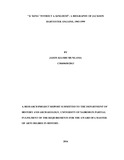| dc.description.abstract | This project paper has examined the life and times of Jackson Harvester Angaine who was born in 1903 and died in 1999. Although the work primarily examined his public life, it highlights his early life and education. The objectives of this study were to examine the early life and education of Jackson Angaine, assess the role of Angaine in Meru and National leadership and to demonstrate his legacy. The trait theory was used in the study. This theory was useful in demonstrating the traits that Angaine possessed which made him a great leader. The study used secondary and primary data which entailed carrying out oral interviews and research in libraries. This work has discussed Angaine‟s entry into politics before independence and his lengthy stay in elective politics in post- independent Kenya. The study has also highlighted why he lost in the 1979 elections, returned to parliament in the 1983 snap elections and the circumstances that led to his exit from politics altogether in 1992 first multiparty elections. This study has also documented Angaine‟s activities in GEMA where he represented the Meru community, one of the three tribes that constituted GEMA. Also examined is the “Change the Constitution” campaign in the 1970s. His role in this abortive scheme and the consequences is discussed. Examined as well is Angaine‟s activity in Meru KANU politics where he was Chairman and dominated for decades.
The finding of this research is that, Angaine‟s dominance in Meru politics undermined the democratic space in the region. He monopolized power in KANU in Meru district and ensured his hegemony in Meru politics. Angaine worked and ensured the downfall of his political opponents. Emerging and upcoming leaders had no space to develop their potential. He ensured that James Njeru, the MP for Tharaka and Assistant Minister for
viii
Defence, was relegated to the peripheries of party leadership.He repeatedly fought and defeated his bitter rival Nteere Mbogori, except in the 1979 elections, and worked for the downfall of Kabeere M‟Mbijiwe who was subsequently sacked as Minister in 1985.Angaine was then appointed Minister of State in he office of the President in charge of Internal Security.
In addition, this work found out that the bitter conflict between Angaine and the Church, specifically the Methodist Church, led to underdevelopment and instability in the Meru region. The political leadership and the Church could not speak in one voice in development matters.
As Minister for Lands, the research found out that Angaine presided over a smooth settlement and registration of land after independence. However his land dealings in the Rift Valley and the allotment of „Z plots‟ was not satisfactory to the communities living there and could have sown the seeds of conflict. The Rift Valley leaders argued that some communities from outside the Rift Valley were irregularly allotted land while the indigenous were ignored. This has contributed to the emotive land issues in the Rift Valley.
Finally the study found out that Angaine propelled the Meru community into national limelight and recognition. | en_US |

